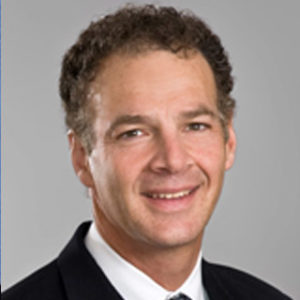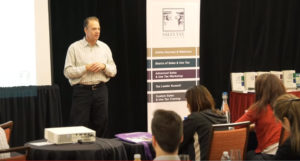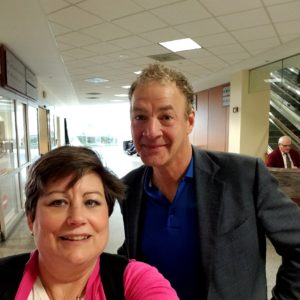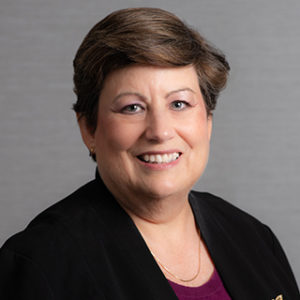Football, Pizza & Sales Tax – A Chat with Faculty Member Jordan Goodman

Welcome to the latest in our series of Sales Tax Institute faculty member profiles! I recently sat down to talk sales tax with Jordan Goodman, State and Local Tax Partner at the law firm Horwood Marcus & Berk Chartered in Chicago.
Jordan has been a Sales Tax Institute faculty member for a long time. He frequently teaches at our Advanced and Basics live courses, and his sincere enthusiasm for state and local tax resonates with our students. He’s a real expert on the subject, and I learn something new each time he presents at one of our courses.
We’re thrilled to have Jordan presenting at the 2019 Advanced Sales and Use Tax Workshop and Basics of Sales and Use Tax course in Chicago.
I chatted with Jordan about his advice for young sales tax professionals, why he teaches for the Sales Tax Institute, and how he started his career in sales tax (would you believe it was Chicago pizza?).
Tell us a little about yourself and how your career path led you to working with sales tax.
Jordan: I started at Arthur Andersen in the mid-1980s, and one of the reasons why I joined was their phenomenal training. My dad had recommended I start my career at a big accounting firm, as they provide you with a lot of training in all types of industry and subject matter so that you can figure out what you want to do from there. I had never heard about state and local tax before joining Anderson.
I’d been there for about 6 months, and I had gone to just about all the training sessions because I had significant student loans and they always had plenty of free food. But after a bit, I started being a little more selective as to what training sessions I attended, as I grew tired of the typical deli tray or pastries for a meal. After a while, you went to a training session based on the food they offered. So, State and Local Tax had a get together one night. They were offering up Lou Malnati’s pizza, which happens to be my favorite. I showed up for the pizza and I got a career for life.
They talked about state and local tax, how it was going to be a growth area. It had a lot of constitutional issues and things that appealed to me as both a lawyer and a CPA. I got involved, wrote some news articles, read some cases and I thought it was great. That was my start, at Arthur Andersen, over 30 years ago, even before they officially had a state tax group.
What do you find most compelling about working with sales tax?
First off, I enjoy working with clients and making them aware of issues that they didn’t know about. The nature of what we do is that we’ve got 50 states – 46 of which impose a sales tax – and all the local jurisdictions. Their interpretations and the availability of exemptions and things that you need to do to comply are vastly different. So, you get a tremendous amount of variety and you have an opportunity to educate people on things they otherwise wouldn’t know about.
For me, it’s kind of a dual reason. One, I like arguing on behalf of and navigating on behalf of my clients. Two, I like educating them about things that they can do to make their lives easier by finding things for them to argue, whether it’s exemptions or credits or resale certificates or nexus.

Jordan teaching at Basics of Sales & Use Tax
What is your area of expertise and what sales tax topic are you most passionate about teaching?
The topic I’m most passionate speaking on and that I do the most speaking on is nexus, the obligation to collect and remit sales tax. Certainly, it’s a threshold issue. I was fortunate enough to be on the team that argued Quill back in 1992. I really cut my teeth on the whole use tax obligation for remote sellers back in the 80s. The issue, defined by Quill, has never gone away. And today it is Wayfair! It has become a very hot topic with marketplaces and states enacting South Dakota type legislation or even trying to fit new concepts into what physical presence requires; whether it’s “cookies” in Massachusetts or having an agent, and it still has application, even post Wayfair.
One of the reasons I like lecturing on it is because without nexus, all the other stuff – whether it’s exemptions, audit technique, credits – doesn’t matter. Nexus is still the threshold issue and it will continue to be.
Do you remember your first time teaching a Sales Tax Institute course? What do you recall about the experience?
Interestingly enough, you and I both worked at Arthur Andersen, but not at the same time. You actually came in after me, probably to clean up the things that I left behind.
I was aware of the Sales Tax Institute once you had left Arthur Anderson and its immediate stellar reputation. I do remember the first time you asked me to speak, and I was thrilled by the number of people who were actually at the course to learn, as opposed to just getting CPE credit. Which is different, because the questions and the involvement that you get are great. It’s not just sitting there and lecturing. It’s having a discussion with the attendees who are participating.
And I remember that the questions and discussion continued after the classes, even when we took a break for lunch. We sat down, and I didn’t really know anybody, but we had a discussion and people were interacting, talking about the topics we had covered. It was just the quality of the people at the Sales Tax Institute and the fact that they were there to learn.

Diane and Jordan
Why do you teach for the Sales Tax Institute?
It’s two-fold. One, I like to talk. And I think I burned my family out talking about state taxes. So, having an interested audience is always fun. But seriously, I love educating. I love getting people informed. I love helping people. And part of my role as a mentor is to get the next generation of people excited about state and local tax, whether that’s in-house people, consulting people, or lawyers. And to make sure that the business’s interests are well represented into the next generation.
I’m not going to practice law forever, but I can teach for a long time. And I feel that part of my responsibility now is to foster the next generation of thought leaders in the state and local tax area.
What advice do you have for professionals who are just getting started in sales tax?
Find something that you’re passionate about. Then the work doesn’t become work. It becomes fun. I would say that to anybody in a broad sense. State and local tax could be considered a very finite area, but within that you’ve got income tax, sales tax, unclaimed property, franchise tax, all different kinds of things that people specialize in.
What I’ve been very fortunate about is – and this is why I’m kind of a nerd when it comes to state and local taxes – I love the subject. I love the constitutionality of it. I love the challenges – it’s always evolving and changing. I’m passionate about it. Work is still work, let’s not kid ourselves. But if you’re doing something that you’re passionate about, you go the extra mile. You read a little bit more, with interest. We get these trade magazines all the time and emails every day. Most people blow those off. I read them pretty voraciously every day, because I love the content. I love knowing about different things.
My advice for young people is: don’t go into the thing that’s going to make you the most money. Find something that you’re passionate about and the money will follow. Find something that you can do for the next 30-40 years and be excited about it. That’s the most important recommendation I would say to anybody.
What do you see for the future of sales tax?
Well, it’s never going to go away. The future in sales tax to me is a broadening of the tax base. The states are going to have to expand into different areas beyond tangible personal property, and we are starting to see that.
Also, I see locals expanding their tax statutes beyond what the states traditionally tax. We see this in our local community with Chicago going after amusement taxes, the lease tax, garbage taxes, and bag taxes. They’re going to go after things that are not traditionally taxed, because they have to expand the base.
At the state level, I see them getting more into services, which will beg the question about situsing. And at the locals, it’s just creating new kinds of taxes, new sources of revenue. I think ultimately nexus is going to become a non-issue. I think we are going to talk about what’s subject to tax and situsing.
What do you like to do in your free time?
I like going to college football games. My wife and I have purchased an RV, and we travel around and go to different college campuses to tailgate and watch football games. I love to fish. I love to run. I love to golf. Basically, anything done outside. Right now, those are the things we love to do.
Many thanks to Jordan for taking the time to talk with me and for all the great insights. If you’d like to see Jordan in action, consider joining us for this year’s Basics of Sales and Use Tax course taking place June 19-21, 2019 in Chicago.
 About the Author:
About the Author: